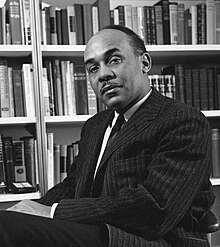 |
| Ralph Waldo Ellison (from Wikipedia) |
In the 1981 introduction to his 1952 novel Invisible Man, Ellison explains the genesis of his novel as a convergence of artistic ambition and "social responsibility":
"[I]t would seem that the interests of art and democracy converge, the development of conscious, articulate citizens being an established goal of this democratic society, and the creation of conscious, articulate characters being indispensable to the creation of resonant compositional centers through which an organic consistency can be achieved in the fashioning of fictional forms. By way of imposing meaning upon our disparate American experience the novelist seeks to create forms in which acts, scenes and characters speak for more than their immediate selves, and in this enterprise the very nature of language is on his side. For by a trick of fate (and our racial problems notwithstanding) the human imagination is integrative--and the same is true of the centrifugal force that inspirits the democratic process. And while fiction is but a form of symbolic action, a mere game of "as if," therein lies its true function and its potential for effecting change. For at its most serious, just as is true of politics at its best, it is a thrust toward a human ideal. And it approaches that ideal by a subtle process of negating the world of things as given in favor of a complex of man-made positives."
Ellison goes on draw an analogy from Mark Twain's The Adventures of Huckleberry Finn, in which the young white Huck goes on a river adventure on a raft with his friend and slave Jim. Their adventure constitutes a mental space "in which the actual combines with the ideal and gives us representations of a state of things in which the highly placed and the lowly, the black and the white, the northerner and the southerner, the native-born and the immigrant are combined to tell us of transcendent truths and possibilities." Fiction, then, "could be fashioned as a raft of hope, perception and entertainment that might help keep us afloat as we tried to negotiate the snags and whirlpools that mark our nation's vacillating course towards and away from the democratic ideal."
This view of creativity, then combines art, a widely recognizable avatar of creativity, with political reform. Such reform depends on the willingness to rectify dysfunction by implementing new models of governance. To create new mechanisms for governance requires, of course, creativity. Political reformers, then, as far as Ellison is concerned, could use the skills people develop in reading and writing fiction to power the "centrifugal force" that leads to a desire to modify the status quo.
No comments:
Post a Comment